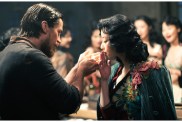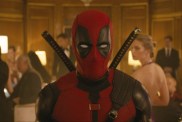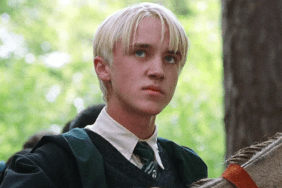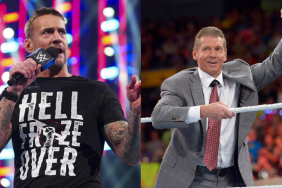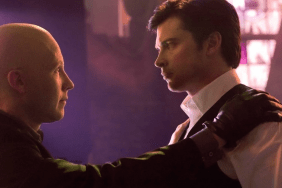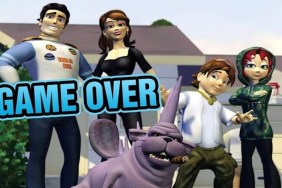Josh Singer on co-writing Tom McCarthy’s Spotlight
Expanding nationwide this Friday is Tom McCarthy’s Spotlight, which features an absolutely fantastic screenplay (probably one of the year’s best) that McCarthy co-wrote with Josh Singer. The film follows the investigative team of The Boston Globe’s “Spotlight” section as they work on a story about Catholic priest who had been accused of multiple incidents of sexual abuse on children but have been protected from jail and prosecution by the Catholic Church, who knew this was going on.
Breaking this story (which you can still read on the Boston Globe site) was huge news, because it put one of the world’s largest religious institutions on the defensive until this day, and the movie is surprisingly riveting despite basically being about journalism. (Of course, having the likes of Michael Keaton, Mark Ruffalo, Stanley Tucci and Liev Schreiber as part of your cast certainly helps.)
If the film feels a little like Aaron Sorkin’s short-lived HBO show “The Newsroom,” it may be because Singer was one of the staff writers on Sorkin’s earlier show “The West Wing,” but he also adapted a number of books into the WikiLeaks drama The Fifth Estate, which is also about journalism in some ways.
RELATED: Spotlight Director Tom McCarthy on the Investigative Journalism Drama
A few weeks back, ComingSoon.net had a chance to get on the phone with Singer for an extensive interview in which he spoke at length about how the project came together and some of the more interesting discoveries made while doing research for the film.
ComingSoon.net: It must be really great for a writer to see a movie like this come together and have all those great actors saying your words.
Josh Singer: It was a pretty terrific ride from top to bottom, and I will say that what was great was just being on set and seeing them all do their thing, and they were all very, very game and excited. Tom, from the very beginning, I mean, he was really shooting for authenticity. What was really kind of amazing was that all the actors picked that up and pretty much every single one, from Mark to Michael to Rachel all went and spent a lot of time with their doppelgangers to try to understand who they were and to try to get those parts right. And that was just really incredible to see, just in terms of that sort of commitment from those guys. Because when you’ve got an actor like Mark Ruffalo or Michael Keaton, these are big, big actors that have been around a while, and for them to put that sort of effort and to really pick up that challenge of, can we really get this right, it was very, very exciting. From the very beginning, we had rehearsals for a week here in New York before we went to Boston and Toronto, and from the very beginning, you can tell that Michael had studied Robby because he literally slipped right into him and it was like Robby was reading the lines. He’s just fantastic. So it was a pretty great thing to watch unfold.
CS: I spoke to Tom earlier this year, and I guess he had just finished shooting it and when I read what it was about, I said, “Well, that’s a very different kind of movie for you, Tom.” It’s not at all what we’ve seen from him or anything. I don’t think he’s done a movie based on a real story before or anything. But you were brought on as soon as he was hired pretty much?
Josh Singer: Yeah. Essentially what happened was Nicole Rocklin and Blye Faust were the ones who originally got the material. And when I say the material, I mean the reporters. They literally were told this story and then they went up to Boston and they really got the rights to all of these six reporters, our primary four reporters and then the two editors, Marty and Ben. Literally, it was then that they started looking for someone. They went after Tom, who probably could do it, and then, Tom decided he didn’t have time necessarily to write it and wanted to bring on a writer. Tom and I had this conversation over Skype, which was pretty nerve-wracking, since I loved all of Tom’s movies and I’m a Jewish kid and this is a story of a Jewish guy who goes into a town at a paper that’s never hired a Jewish editor, that’s never hired an outside editor, and a guy who goes in there and literally just on the first day goes after the church. That in and of itself was just an amazing story, let alone all the twists and turns that happened after. So I was very enamored with the story and obviously a big fan of Tom’s, so that Skype conversation was pretty nerve-wracking.

But sort of about a month after that, he hired me, and originally he hired me to write and he was going to direct. It all started really, Mike Rezendes, who Mark Ruffalo plays in the movie, happened to be off in LA. So literally, we spent a week, where I took him to lunch every day that week, and literally, I was looking for—and I don’t know if you know LA all that well—but I took him to Wagner’s downtown for the best pastrami sandwich, The Lazy Ox, for lunch and all of my favorite sort of like, some hole in the wall, some a little nicer, but my best food in LA kind of thing, because Mike’s not fancy food, but good food. Every day, I had my little tape recorder and my Sony digital recorder and I’d record and talk for two, three hours. That’s how sort of we got the basics of how the investigation unfolded. We walked through the entire investigation. Then I said to him very, very slowly—and at the end of that, we went down to La Jolla to visit Richard Sipe. That’s the voice on the box that Mr. Jenkins does.
CS: Oh, that’s Richard Jenkins? I was wondering who that voice was, because it’s a great voice. Wow, I’m a little surprised there, okay.
Josh Singer: Yeah, yeah. Pretty good, right? Richard Sipe is this amazing guy who studied this thing for 50 years and was really sort of this real prophet in the wilderness. So sitting with him was incredibly powerful, not just because his story is powerful, because he’s been talking about clergy sex abuse from the late ‘60s onward and studying it, but also because his theories on why it happened are really provocative and I think right on the money in terms of talking about the number of people in the priesthood who were having sex. So even if they’re having sex with adults, they still have this secret that they’re covering up, and so, everybody’s living a double life. Which we talk about in the movie. It just creates this culture of secrecy in the system that winds up with a natural reason to protect pedophiles as opposed to expose them. So it was really fascinating talking with him, and the end of that week I had a 54-page document, which was all my notes from Mike, which I had typed up. And then I had the basics of the theory. So in some ways, that was the basic master document, but I wanted to go up to Boston. I wanted to sit with all the reporters. I wanted to sit with Marty Baron. So I flew east to New York. I was living in LA at the time. I flew east to New York and I said to Tom, “Do you want to come?” You know, as a writer, you always want your director invested and on board.
CS: I was wondering how much Tom was involved in doing those interviews with Mike and Richard.
Josh Singer: Yeah, it was a lot of time, but it was literally just a week of interviews. I sent him the documents as soon as I finished it. Then the next week of interviews, he was going to be up in Boston, and since he’s on the East coast, I was like, “Why don’t you come?” So we went up to the East coast together and it was sort of a lot of fun because we were getting to know each other, as we were interviewing these reporters. The reporters are great. I mean, as fun as they are on screen, they’re even more fun in person. We spent a lot of time, I think we interviewed all of them that week. I think I sat with Phil Saviano that week as well. Tom was there for like, three of the four days. When I got back, he was like, “Well, let’s go again. When are we going again?” Like, he kept pushing us to go back to Boston. We went five, six times, such that you could tell me almost any character in the movie, and we’ve talked to the real life counterpart.
That was really about Tom wanting to get it right. From the very beginning, he had this vision of authenticity, like, “Let’s get it right. Let’s not collapse characters.” The storyline’s very intricate, and he’s like, “Let’s not back off of that. I want to get this absolutely right.” There’s this French movie that had come out, I think in 2012, called “Polisse.” He didn’t make me watch it because it’s about police investigating abuse, he made me watch it because it’s a fantastic ensemble. He said, “Look, what I love about it is that you’ve got 12 different actors, and what you get is a sense of what it is to be part of this unit, almost more than you get the individuals.” Yes, the individuals, there’s enough there that you follow them and are interested in all of them. I sort of watched it and I got very scared and I said, “We’re not doing all of them in here, are we?” He said, “No, no, no, but there’s something about this team, in some ways, the star of the movie is not any of the individuals, it’s the ‘Spotlight’ team, right? It’s ‘The Boston Globe,’ right?” That’s the star of the movie, as opposed to it being any of the individual reporters. So which was pretty interesting, and I think actually in this day and age, in the 70s, that would not have been so unusual, but in this day and age, I think it’s pretty unusual and not a mainstream approach, which frankly made me pretty nervous. But one thing that made me less nervous is Tom got very invested early on. He kept telling me to go to Boston and he kept coming along. I started writing an outline, and was very quickly just feeding him pages.

It was very quickly apparent that he wanted to engage such that like, through that fall and early winter, we started breaking the story together. I mean, we really were breaking it together, such that in December, he turned to me and it was clear that he wanted this to be one of his next couple of projects. It was also clear that he said like, “Look, this will go faster if we write it together.” I basically was like, “Terrific,” because frankly, Tom’s a great writer and I was having a blast working with him and I knew I would learn a ton, and I feel like we brought different strengths to the piece. As you say, he hasn’t necessarily done anything with this kind of scope before, but one thing that he does so well is that incredible small character work and that’s stuff that I’m still learning how to do, because my background is fairly nontraditional. I came up from network television and I’ve been in features now for three, four years, but it’s not where I come from naturally. I went to law school. I did tend to think structure down, whereas Tom I think, he was trained as an actor and he thinks about character and intimate little interactions up. So in some ways, I feel like those two different approaches wound up meeting very well. Anyway, so we basically started writing together, and we’d already been writing together more or less. But basically, right after the New Year in 2013, we started writing. We had a script done in about six months and we put it aside because he went off to shoot “The Cobbler” and I went off to write a movie for Fox that I owed, that I had to write. Then we came back together in early spring of 2014, and basically worked on the movie then consistently through 2014 through prep, through production. We did more rewriting than I would’ve ever believed on set, I think which made the film much better. So that was sort of how the process worked.
CS: I want to ask about Mike specifically. He doesn’t actually say anything in the movie, I get the impression he has more of a horse in the race, maybe because he’s a lapsed Catholic. He doesn’t have kids or anything, but it seems very much like he’s very driven that this is something really important and he realizes that. When you talked to him, did you get the impression he may have had bad experiences of his own or was he just another lapsed Catholic?
Josh Singer: No, I mean, look, all four of the reporters were lapsed Catholics. The other question is, why didn’t you make any of the reporters more Catholic, so that they were going to church and whatnot, going to Catholic Church? So actually, there’s the church that the grandmother, she’s not really a practicing Catholic. You know, Matt goes to church, but he goes to his wife’s Presbyterian Church. He’s not a practicing Catholic anymore, although he’s a practicing Christian. The question from the audience came, “Well, why didn’t you make any of these guys practicing Catholic to show the struggle?” The answer was, “Because none of them were.” (Laughs) Basically we wanted to represent these people as they were. We didn’t want to muck with—if you’re looking for how a Catholic deals with this, we have Richard Sipe talk about it, because Richard Sipe considers himself a Catholic. One thing that Richard said to me, which we incorporated into the movie, one of my favorite lines, he said, “The Church is an institution of men and that’s passing. My faith is in the eternal. I try to separate the two,” which I thought was sort of beautiful, and to me, that’s what I think a lot of Catholics try to do, as they continue to try to practice in the wake of what’s happened and continues to happen with the church.
I think with Mike, I think there are two things that sort of drive his character. One is, I think he’s very much a true believer. We, at some point, had a line, “Mike Rezendes, true believer,” wanting to make fun of him. But I think that’s true, like he’s the guy who has faith in journalism and believes in what he does in some ways more than anyone else. Journalism is his religion, right? So I think for that reason, he keeps going after the bad guys. If you call Mike and say, “What’s going on? How you doing?” He’s like, “You know, going after the bad guys. Locking them up!” (Laughs) That’s literally what he’ll say to you. So he’s got very much that kind of energy to start. In terms of his Catholicism, it’s funny because—and you’d have to talk to Mike—I think he left the Church pretty early on, as we say in the movie. I think that’s all right on. But even more specifically than we say in the movie, Mike said to me very early on, “There used to be these ads in ‘The Globe,’ ‘Come back to the Church,’” because literally, the Church would take out ads saying, “Come back to the Church.” This was in the 90s, even before the scandal, they were starting to have problems retaining a flock, right?
CS: In fact, the Pope just did a U.S. tour and I think the whole point of the tour was partially that as well, the recent visit by the Pope. I was seeing commercials for the Catholic Church the day after he left the country.
Josh Singer: So Mike said, “I used to see these ads in ‘The Globe’ or ‘The Herald’ which would say ‘Come back to the Church.’ I used to think that maybe I would.” Mike said this to me, and for Mike to say this, when clearly, Mike had left the Church when he was 16 and had serious arguments with folks about the infallibility of the Pope and had really left the Church like, “I can’t believe this,” for that guy to say, “Still, I look at these ads and say, ‘I thought, maybe,’” That’s really powerful. I think the thing Tom found compelling about that is, I think Tom is a bit of a lapsed Catholic as well, and I think that’s sort of how he felt about it, right, and how I think a lot of Catholics feel about it. Even like, and I’m Jewish and I don’t go to synagogue regularly, but I’m always thinking, “Yeah, I’m going to go back there.” So with me, it’s less because of any news, just I’m busy and so I go twice a year to schul, you know, on Rosh Hashanah and Yom Kippur. But I think a lot of Catholics, it’s a similar thing with maybe a little more friction to it, right? For Mike to say I’m going back to the Church, to have that idea, I saw those ads and I was drawn back, that felt very powerful. So the idea that the letters and what he discovered, basically closing that door, which is a door that I think most people don’t want to have closed, but I think that struck us as a pretty—even with a guy who’s not going to church on a regular basis, that struck us as a pretty big deal. In terms of like, if there’s history there, you’d have to ask Mike. It felt to us like there was more there.

CS: Usually a movie like this will fictionalize stuff to try to make things more interesting, but it seems like the truth was more interesting than the fiction in thise case, and you didn’t have to do any of that. You have a lot of characters in this, and I guess you could’ve combined some of them and done things like that, but you avoided that and just accepted this would have a lot of characters.
Josh Singer: Yeah, I mean, look, coming from a more conventional place in terms of screenwriting, it definitely made me nervous going in. Also, the lawyers are very distinguishable, but on the page, they’re not quite as distinguishable, right? I mean, they are. I think they read differently on the page, but you need a smart leader to get that. I don’t know if your average studio exec gets that. Now Jonathan King at Participant is going to get that. He’s super smart, right? Or Tom Ortenberg at Open Road, sure. But at some of these bigger studios, the average studio exec, I don’t know if they’re going to be able to spot that nuance. The great thing about writing with a director like Tom is you know he’s going to cast the sh*t out of it. You know he’s going to get great actors and you know he’s going to get great performances. So we got two lawyers who on the page you feel are very different, but you worry about the loss of nuance. Well, I know Tom’s going to cast Stanley Tucci and Billy Crudup and he’s going to get great performances and those two lawyers are going to come across as very different in the actuality of it. It’s a luxury you have writing with a partner who’s actually a great actor himself and knows how to get great cast and then get great performances out of the actors. It’s such a huge luxury and I love Tom and I’d be excited to work with him again, but that is right up there. It’s the greatest luxury in the world, knowing that the leap from page to screen is not quite as great because you have that level of confidence in that particular thing.
I’d say the other thing is that oftentimes I’ll find that the facts are cooler than fiction, even if it takes you a little while to get them. For example, Macleish in the middle of the film says, “I gave you 20 priests, right, because I sent you 20 priests and you buried it,” and we don’t believe it, right? Then at the end of the film, you find out indeed there was an article they dig up and it’s buried on page B42 of “Metro,” and Robby happened to be the “Metro” editor. We didn’t know that going in. None of the reporters told us that. We had heard plenty of rumor that “The Globe,” after the Porter case, had sort of shied away from covering the story.
There are a couple of famous stories that are legend at “The Globe,” about a magazine article that came out after the Porter case, that the editor flipped out about like, “Why are we still covering this?” and about certain people saying, “No more priests.” You definitely had a sense that there was some pushback against covering priests after Porter, right? But we didn’t know about that article until we went and talked to Eric Macleish. Now we had already been up to Boston like, half a dozen times, and Tom was like, “Let’s go talk to Eric Macleish.” At that point I thought Macleish was just a sleazebag lawyer and I thought he’s just going to spin us. I really tried to talk Tom out of it. I’m like, “He’s just going to spin us. It’s a waste of time. We’re representing him in the movie. I’m a little worried. I don’t want to make him aware we’re representing him in the movie.” We already talked to his partner at the time, Bob Sherman, who’s now the ambassador of Portugal and who had given us basically the rationale, but he left the whole rationale of why you might not want to take these cases to court, but instead settle them. Tom was adamant. He was like, “I want to sit with the guy and I just want to know what he looks like, what he sounds like because I’m going to cast him. I want to have an idea.”
So it was me dragging my feet, and we’d go up to Boston and we had a couple of sit-downs and we sat with Eric Macleish. Of course, he starts to spin us and he’s like, “Yeah, ‘The Globe’ reporters are heroes, but I did my part. I was out there in Fall River. I sent this before the case.” Then he said to us, just what he said to Robby in the movie, he said, “I sent them 20 briefs right after Porter. In 1993, I sent them 20 cases and they buried it. They buried the story, so I couldn’t use the press.” Literally Tom and I are sitting there, and we look at each other, and then we finish our meeting with him, and we walked out and I’m was literally like, “That guy is so full of sh*t. That is totally full of sh*t. That’s not true.” I went home. I went on “The Boston Globe” archive and I looked it up, just to check. I literally did a search for Macleish in ’93, roughly around when he said the letter came out, and there it was and there was an article saying, “Porter lawyer claims he has 20 priests in Boston,” like whatever the headline is in the movie. I literally found the article, and indeed, it was on page B42, buried in the “Metro” section. I couldn’t believe it. So I sent it to Tom and we were like little kids, right? (Laughs)
CS: It’s pretty amazing that you end up doing your own investigation on the Spotlight story, and you found more stuff than the reporters actually knew about. You said that none of the guys at “Spotlight” actually knew about that?
Josh Singer: I don’t know about whether they knew. They didn’t tell us about it, but I don’t know whether they knew about that article or not. They certainly didn’t tell us about it. We’re talking to reporters or at least asking the questions and answering them. Look, I certainly understand if they don’t want to put that front and center in their story. Anyways, after Tom and I discussed it. I shot an email to Robby and say, “I found this. Tell me about this.” He wrote me an email back that basically was the same thing as what Robby says in the movie, which is like, “I was the ‘Metro’ editor at the time. It was on my watch. I don’t remember it, but I’m responsible.” It was this heartbreaking—because look, we love Robby, right? He’s the greatest. He’s a fantastic journalist, right? He’s the guy that hopefully will inspire lots of people to go into this field, right? So we’re not out to hang Robby, but it was this heartbreaking email, where it basically was like he did a mea culpa and he’s like, “I don’t remember it, but it was on my watch.”
To me, it’s such a pure example of we could’ve made something up, but what we actually found is so much more powerful than what we would’ve made up. It’s very tricky doing pieces like this, because sometimes you don’t find the thing that’s going to make it work in that way, but again, it really speaks to this vision of authenticity and trying to get it right. It’s still a movie, and it’s dramatized.
CS: Did working on “The Fifth Estate” drive you to become more of an investigative reporter yourself when doing research for this movie?
Josh Singer: I would say “The Fifth Estate” was great in that I got to study journalism for a good couple of years. I’m proud of my work in that movie. I think in some ways the message that I was going for in that movie didn’t come across nearly as clearly as this one does. I think that in terms of the fictionalization of that movie, I think by its very nature, because we were consolidating three years as opposed to six months, there was more dramatic liberties taken, although I think that movie is pretty spot on as well, in terms of the big moves and the ways that Daniel and Julian interact. I think the biggest thing for me is what the locus of the story is. “The Fifth Estate,” I think that the locus of that story, I set it on Daniel. I think that was the wrong locus, because while I love Daniel and he’s a great guy, I think he’s not necessarily charismatic enough to carry a movie as a character. In fact, I think because I didn’t want to fictionalize him in any ridiculous way, the character was a little vanilla and Daniel is a little vanilla. He was young and naïve. That coming of age arc, which is always such a hard one to do, I think didn’t quite pop. In some ways, a year later, looking back on it, I think I probably would’ve done a movie that was about Nick Davies and Julian Assange, about “The Guardian” reporter who reeled him in. Nick Davies is a much more interesting character and I think that contrast would’ve been more powerful. So I think that’s just, to me, the lesson there is just in terms of looking at your story and what’s your locus, right? I think in that way, if Tom had said, “All right, this movie’s all about Robby and we’re not going to focus on any of the other” I don’t know if it would’ve worked as well because I think the team and approaching from this ensemble way, I think is part of what makes it special.
Spotlight is now playing in select cities and will expand nationwide on Friday, November 20 and then more theaters over Thanksgiving.
(Photo Credit: Kerry Hayes)
Spotlight
-
Spotlight

-
Spotlight

-
Spotlight

